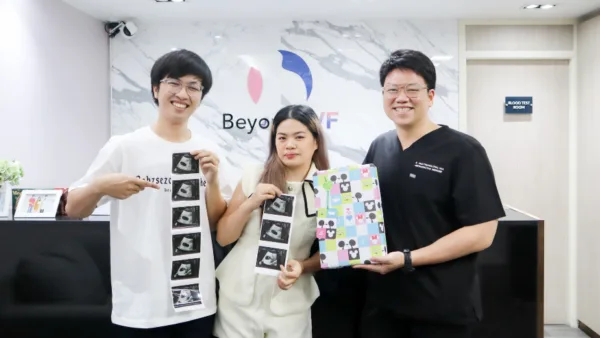Age 39 with Ovarian Decline – Successfully Pregnant with ICSI by Dr. Ton at Beyond IVF!
At 39 years old, natural conception becomes significantly more challenging, especially for Parinya, who not only faced age-related fertility decline but also ovarian insufficiency. Today, however, she is successfully pregnant thanks to ICSI treatment with Dr. Ton at Beyond IVF, a leading fertility specialist with over 20 years of experience.
A Race Against Time
After trying to conceive naturally for many years, Parinya became increasingly worried as she approached 40. She feared that if she did conceive, there might be risks to both her health and the baby’s development. Wanting the best medical care, she decided to consult Dr. Ton at Beyond IVF.
Dr. Ton recommended a full fertility assessment for both partners before determining the best course of treatment.
Comprehensive Medical Evaluation
The husband underwent sperm quality and infection testing – Results were normal.
The wife underwent hormone testing and an ultrasound – Results showed ovarian insufficiency, making natural conception extremely difficult.
Given these results, Dr. Ton advised ICSI (Intracytoplasmic Sperm Injection) combined with embryo chromosomal screening (NGS) to maximize the chances of a successful pregnancy.
The Treatment Process
The process began with ovarian stimulation, carefully monitored via ultrasounds to ensure optimal egg development. Once the eggs were ready, Dr. Ton performed egg retrieval, followed by sperm collection from her husband.
In the laboratory, scientists used the ICSI technique to inject the highest-quality sperm directly into the best-quality eggs.
Embryos were then screened using NGS to ensure they were chromosomally normal before implantation.
The Moment of Success!
After years of waiting, the long journey finally led to success! Dr. Ton confirmed the pregnancy, bringing immense joy to the couple.
Treatment Details
ICSI (Intracytoplasmic Sperm Injection) – A high-precision technique using a special microscope to inject sperm directly into the egg, increasing the success rate.
NGS (Next-Generation Sequencing) – Chromosome screening to ensure the embryo is free from abnormalities before implantation.
Age and ovarian decline didn’t stop her—Beyond IVF made her dream of becoming a mother come true!



